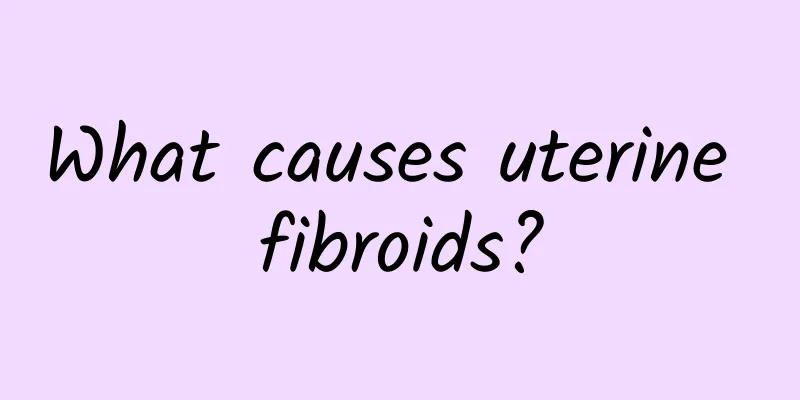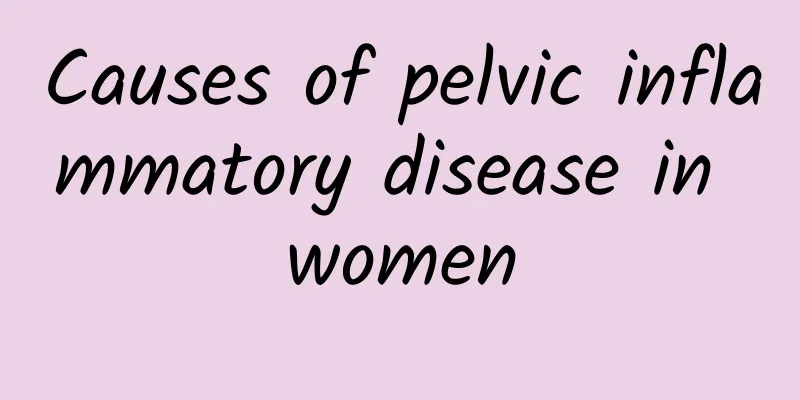What causes uterine fibroids?

|
The formation of uterine fibroids is usually related to genetics, hormone imbalance, environmental factors, and certain physiological or pathological changes. The risk of occurrence can be effectively reduced by controlling hormone secretion, improving lifestyle habits, and monitoring early symptoms. 1. Genetic factors Uterine fibroids have a certain genetic tendency. If a direct relative in the family, such as a mother or sister, has a history of uterine fibroids, the chance of developing it may be higher. This is because the relevant genes may cause abnormal proliferation of uterine smooth muscle cells. For those with a family history of the disease, regular gynecological examinations can be performed to detect problems as early as possible. 2. Hormone imbalance Fluctuations in estrogen and progesterone levels are important causes of uterine fibroids. Excessive secretion of these two hormones stimulates the rapid growth of uterine myometrial cells, thus forming fibroids. For example, pregnancy or long-term oral contraceptives may lead to elevated estrogen levels, but hormone imbalance is not the only cause. After menopause, due to the decrease in estrogen secretion, fibroids often stop growing or even shrink. Young women are advised to avoid long-term use of hormone drugs, especially the abuse of hormone drugs without the guidance of a doctor. 3 Environmental and lifestyle factors Long-term psychological stress, obesity, lack of exercise and unhealthy eating habits may indirectly affect hormone balance and increase the incidence of fibroids. For example, a high-fat, high-sugar diet can easily increase estrogen secretion, and chronic stress can interfere with endocrine function through the central nervous system. It is recommended to maintain healthy living habits, consume more fiber-rich foods such as green vegetables and whole grains, reduce the intake of high-fat foods, and develop the habit of regular exercise. 4 Pathological factors The formation of uterine fibroids may be related to certain pathological changes, such as other uterine diseases such as endometrial hyperplasia, chronic uterine inflammation, or trauma such as uterine damage caused by artificial abortion or intrauterine operation. Repeated damage to the uterus may induce abnormal cell proliferation and eventually form fibroids. Avoiding unnecessary intrauterine surgery and choosing appropriate contraceptive methods can reduce uterine trauma. 5 Hormone replacement therapy and drug factors Certain drugs, such as estrogen supplements, may induce rapid growth of fibroids. If women taking hormone therapy find abnormal vaginal bleeding or abdominal discomfort during non-menstrual periods, they should consult as soon as possible to consider changing or adjusting their treatment plan. During treatment, regular checkups can help detect possible side effects of the drug in a timely manner. The formation of uterine fibroids is the result of the combined effects of many factors. Women should pay attention to regular gynecological examinations, especially those with high-risk factors. When early symptoms such as heavy menstrual flow and abdominal pain are found, seek medical attention in time to avoid worsening of the disease or other complications. By improving health awareness and scientifically managing one's own health, the occurrence and development of uterine fibroids can be effectively prevented. |
<<: What are the minimally invasive treatments for uterine fibroids?
>>: What to do if your uterus is prolapsed
Recommend
Does premature menopause affect life expectancy?
Many patients do not understand the hazards of am...
Can pelvic peritonitis be cured by taking medicine?
The occurrence of pelvic peritonitis is also rela...
Daily care after ovarian cystectomy
Ovarian cystectomy is suitable for patients with ...
What kind of exercise is better for uterine fibroids? What kind of exercise can make uterine fibroids smaller?
What kind of exercise is better for uterine fibro...
How to effectively treat moderate cervical erosion?
How to effectively treat moderate cervical erosio...
What are the symptoms of early cervical erosion? Check out 2 early symptoms of cervical erosion
Cervical erosion is a common gynecological diseas...
shock! A high school girl stepped on the flywheel for 10 minutes but couldn't stand up! Rhabdomyolysis may lead to acute renal failure
If you suddenly overload yourself with heavy weig...
Women with high psychological stress are more likely to have amenorrhea
Research has found that women with anxious, intro...
A 19-year-old girl got her tampon stuck when she used it for the first time. She went to the hospital for help. The doctor smiled bitterly: It’s useless.
Xiaohong has just entered the 19th year of her li...
What are the folk remedies for treating pelvic peritonitis?
Most women suffer from gynecological inflammation...
To put an end to fatty liver disease, take care of the "Miss Dutch" in your body first!
Regardless of gender, everyone has a "Miss H...
Yang Mi lost weight after giving birth, her secret weapon is... Famous weight loss doctor: Be careful to detonate these four landmines in 5555 weight loss
Blind destruction? You can quickly lose weight to...
Can I get pregnant after having amenorrhea?
Amenorrhea after childbirth is usually caused by ...
Pelvic inflammatory disease care is very important in life
The treatment of pelvic inflammatory disease must...
Experts remind: the main causes of ectopic pregnancy
Ectopic pregnancy is a gynecological disease with...









